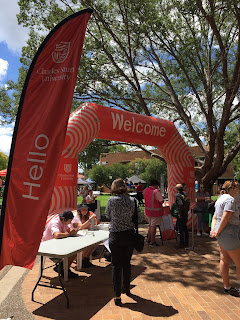Today Dr Ben Phạm and I had my first supervisory meeting for 2021 with Mrs Hằng Nguyen and Mrs Vấn Phạm who are the Masters students in Vietnam.
 |
| Dr Ben Phạm, Professor Sharynne McLeod, Mrs Hằng Nguyen and MrsVấn Phạm |
Today, as Vietnam has just gone into lockdown again for COVID they have completed assessing 48 children with speech sound disorders. This is a huge achievement as the only other English-language paper written about children with SSD had four participants:
- Tang, G., & Barlow, J. (2006). Characteristics of the sound systems of monolingual Vietnamese-speaking children with phonological impairment. Clinical Linguistics and Phonetics, 20(6), 423-445. https://doi.org/10.1080/02699200500100910
Recently there has been a Vietnamese-language paper written about 65 children in Southern Vietnam undertaking a retrospective file analysis, including a description of results from the Intelligibility in Context Scale. Congratulations Mr Quyên and team from Children's Hospital No. 1.
- Hoang, V. Q., Tra, T. T., Nguyen, T. T. H., Tran, T. M. D., & Cao, P. A. (2019). Đặc điểm âm lời nói của trẻ bị rối loạn âm lời nói đến khám tại bệnh viện nhi đồng 1 và trường đại học y khoa Phạm Ngọc Thạch từ tháng 1 đến tháng 6 năm 2018 [Speech sound characteristics of children with speech sound disorders at Children’s Hospital 1 and University Of Medicine Pham Ngoc Thach from January 2018 to June 2018]. Y Học TP. Hồ Chí Minh [Ho Chi Minh City Journal of Medicine], 23, 202-207.
Here is the English translation of the abstract
Objectives: Describing the clinical characteristics of speech sounds of children with speech sound
disorders from 4 to 7 years old receiving intervention at Children Hospital 1 and at the clinic of Pham Ngoc
Thach University of Medicine in Hochiminh City from January to June of 2018.
Methods: A retrospective research on secondary data which were 65 Speech therapy case files. A
research describes the speech sound characteristics of patients presented in the specialty case files.
Results: The outcomes recorded the occurrence of 5/9 phonological processes, which were stopping,
gliding, glottal replacement, backing and fronting. The other processes were initial consonant deletion
12/65, nasalisation 9/65 and devoicing 2/65.
Conclusions: A retrospective research has provided us a general picture of the pronunciation errors
and phonological processeses found in children speaking Vietnamese language. Speech sound disorder issue
can affect communication quality, learning quality of children, especially the quality of reading – writing subject at elemenetary school.
Our Masters students (Hằng Nguyen and Vấn Phạm) have prospectively assessed children in Northern Vietnam using the Vietnamese Speech Assessment and the Intelligibility in Context Scale and will be undertaking more extensive analysis. So, the two papers will be very complementary and will add to the literature base for Vietnam and provide a more nuanced understanding of children with SSD in Vietnam. It is exciting to see this field is emerging.





























